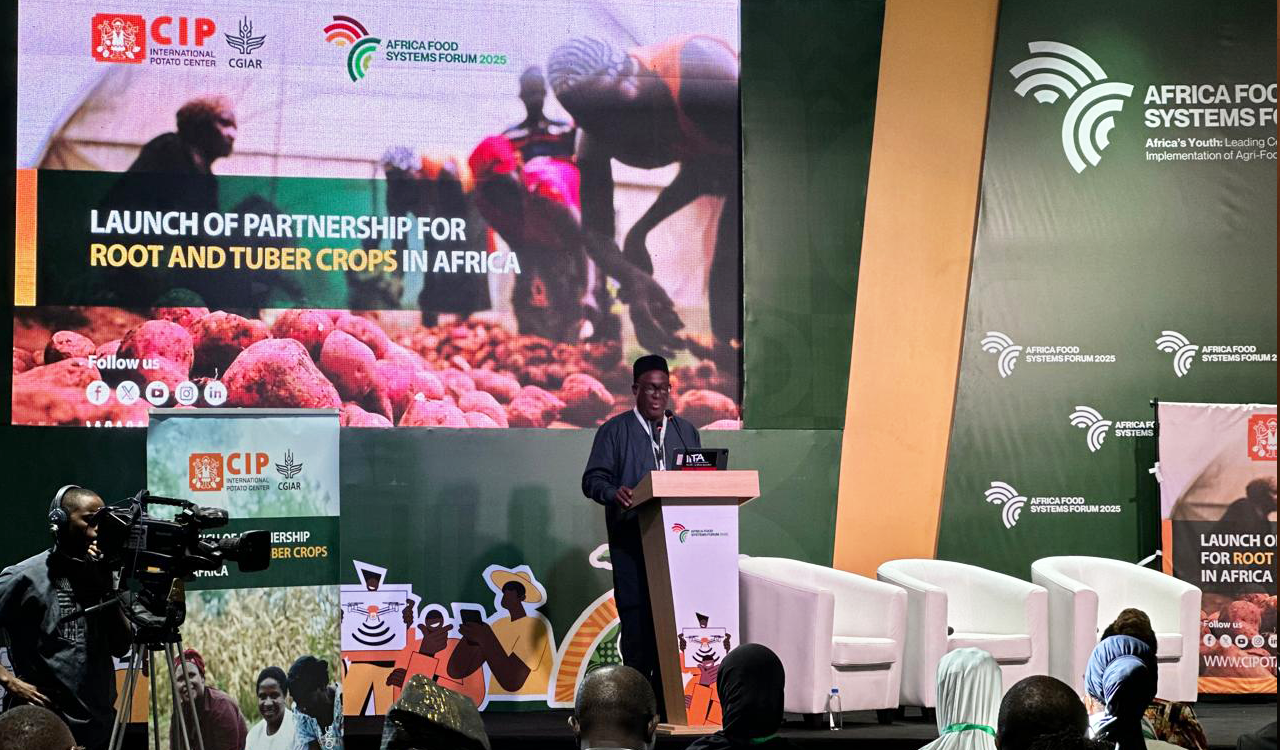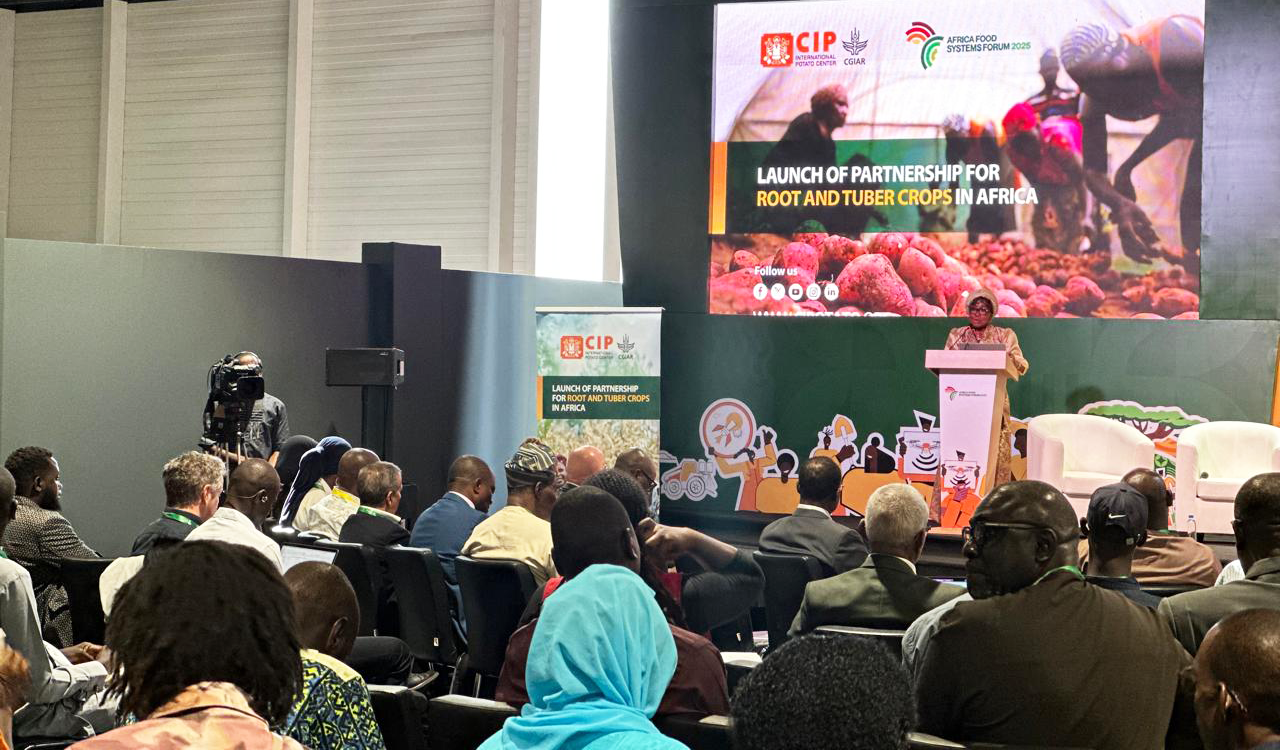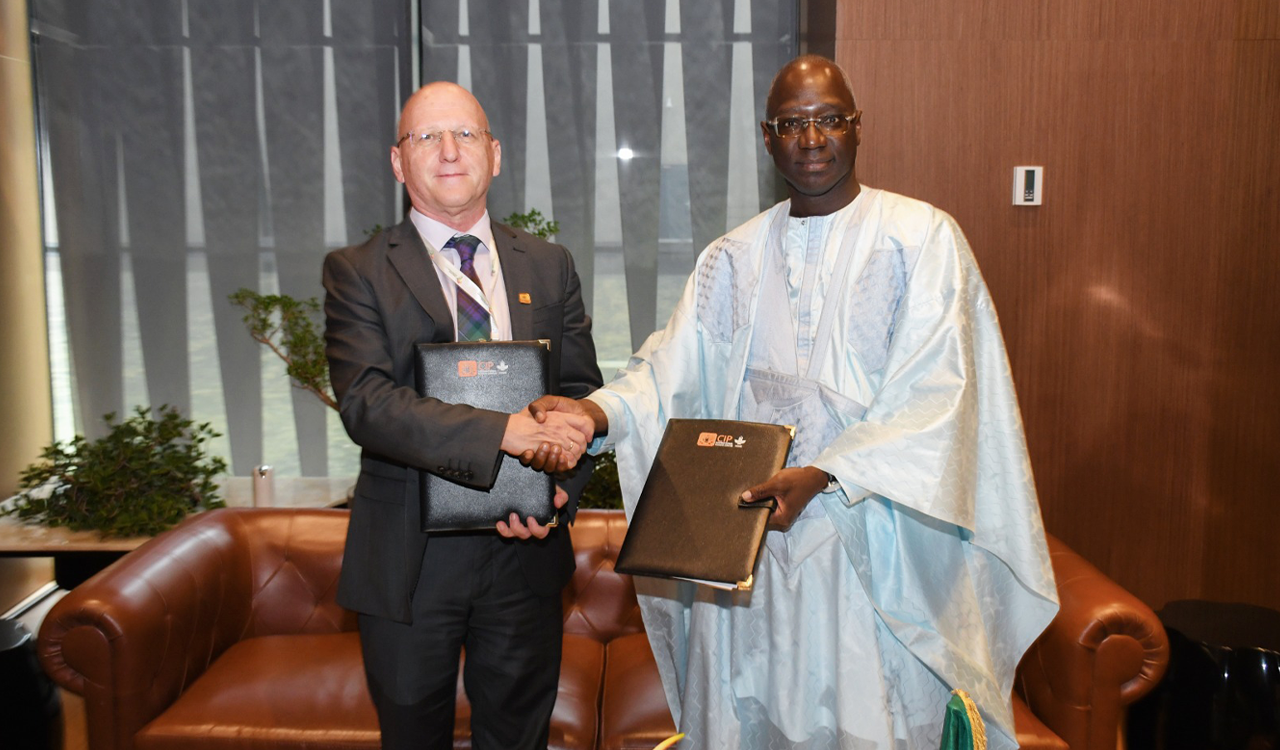
The Africa Food Systems Forum (AFSF) 2025 took place in Dakar, Senegal, from August 31 to September 5, bringing together governments, private sector leaders, academia, civil society organizations, and youth and women’s groups to accelerate the transformation of Africa’s agrifood systems. With more than 350 speakers and over 6,000 participants from 113 countries including presidents and ministers the forum was one of the largest platforms for shaping the continent’s food future. Held under the theme “Africa’s Youth: Leading Collaboration, Innovation, and Implementation of Agri-Food Systems Transformation,” this year’s forum placed young people and women at the center of the dialogue, underscoring their critical role in building resilient, inclusive, and sustainable food systems.
The International Potato Center (CIP) joined global partners, policymakers, and development leaders at the event to highlight the strategic role of Root and Tuber Crops (RTCs) cassava, yam, potato, and sweetpotato. These crops, which already account for more than 40 percent of Africa’s food production, have long been the backbone of food security across the continent. Yet, they remain underutilized despite their potential to drive sustainable agrifood transformation, particularly in the face of climate change. Through a series of high-level sessions, CIP underscored how science, innovative financing, and farmer-centered approaches can unlock this potential and ensure RTCs contribute fully to Africa’s agricultural transformation.
AFSF 2025: Islamic Development Bank (IsDB) – CGIAR Partnership for Impact

The Islamic Development Bank (IsDB) and the Consultative Group on International Agricultural Research (CGIAR) convened a high-level session at the Africa Food Systems Forum (AFSF) 2025 in Dakar, Senegal on 2 September 2025, under the theme “IsDB–CGIAR Supporting Food System Transformations: Accelerating Impact through Innovation and Partnership.” The session showcased how science-driven solutions, co-financing, and government partnerships are reshaping Africa’s food systems and accelerating the continent’s journey toward resilience and sustainability
Moderated by CIP’s Africa Regional Director, Dr. Joyce Maru, the high-level session brought together partners including the World Bank, African Development Bank, ILRI, and ICRISAT to discuss how finance and policy can accelerate agricultural transformation across Africa.
CIP Director General, Dr. Simon Heck, urged stakeholders to view challenges as opportunities. “The hurdles facing Root and Tuber Crops in Africa from limited market access and low productivity to climate risks are also opportunities to act. Local perspectives, research, and partnerships are critical to turning insights into action,” he said.
Echoing this call, CIP Senior Principal Scientist, Dr. Paul Demo, stressed the need for a results-driven, market-oriented strategy. “Root and Tuber Crops strengthen value chains and enhance nutrition. But scaling requires governments and funders to remain fully engaged, with clear targets and timelines,” he noted.
Held under the theme “IsDB–CGIAR Supporting Food System Transformations: Accelerating Impact through Innovation and Partnership,” the session highlighted how science-driven solutions, co-financing, and government collaboration are reshaping food systems. The IsDB–CGIAR partnership represents a bold step in positioning Root and Tuber Crops at the center of Africa’s agricultural transformation driving income growth, strengthening local economies, improving nutrition, and building resilience to climate change.
Launch of Partnership for Root and Tuber Crops in Africa

Root and Tuber Crops (RTCs) contribute more than 40% of Africa’s food production and in several countries over 60%. While total production has doubled over the past 20 years, this growth has not resulted in increased productivity, resource efficiency, or economic and nutritional value. On September 3, CIP and partners officially launched the Partnership for Root and Tuber Crops in Africa at the Africa Food Systems Forum in Dakar, Senegal. This Partnership marks a bold step toward positioning Root and Tuber Crops (RTCs) as key drivers of sustainable agricultural transformation, boosting incomes, strengthening local economies, improving diets, building resilience to climate change, and creating profitable, nutritious, and sustainable food systems for the future.
“Investing in RTCs has the potential to accelerate Africa’s transition toward sustainable, climate-resilient, and equitable agrifood systems, since the local nature of their production and supply offer business opportunities to local entrepreneurs and also sustain local economies, unlike other commodity crops which are globally traded and sourced. Naturally resilient to climate stress, rich in essential nutrients, and well-suited for inclusive, market-driven value chain development, RTCs offer a strategic pathway to build food security and economic opportunity”- Dr. Joyce Maru, Regional Director for Africa, CIP.

Africa’s food systems are under growing pressure. By 2050, the continent’s urban population is expected to reach 1.5 billion, tripling current numbers and straining food supplies. Farmers are already grappling with climate shocks, declining productivity, and weak seed systems, particularly for staple crops such as potato, cassava, and sweetpotato. Heavy reliance on food imports further exposes countries to volatile global markets. At a time when climate shocks and land pressures threaten Africa’s food supply, Root and Tuber Crops offer strategic advantages, Dr. Simeon Ehui, Director General of IITA, urged a shift in perception; we must look beyond seeing them as subsistence crops and reframe them as drivers of transformation.
“At a time when climate shocks, price volatility, and land pressures threaten Africa’s food supply, Root and Tuber Crops (RTCs) offer strategic advantages: they are climate-resilient, adaptable, and culturally embedded in African diets. To unlock their full potential, we must look beyond RTCs as subsistence crops and reframe them as drivers of transformation”- said Dr. Simeon Ehui, Director General of IITA.
The technical challenges of RTCs are well known, including their relatively demanding seed systems, high postharvest losses, bulkiness, and perishability. These have been compounded by a comparative neglect in research, technical services, value chain development, and policy attention.
“In spite of these gaps, however, farmers have increasingly turned to RTCs for reliable harvests and higher incomes and consumers in rural and urban areas value RTCs as a building block of affordable and healthy diets. Projections of food and nutrition security under climate change and global crises scenarios agree that RTCs will be ever more important in future, and investors as well as policy makers have started to pay increasing attention to RTCs” –added Dr. Simon Heck, Director General, CIP

Prof. Yaye Gassama, Senegal’s National Academy of Sciences and a CIP Board Member, stressed the role of women and youth. Women are the backbone of RTC production and processing, while youth bring innovation and entrepreneurship. If we invest in women processors and empower youth entrepreneurs, RTCs can become vehicles for food security, employment, and social transformation.
“The real drivers of Root and Tuber Crops transformation are women and youth. Across Africa, women are the backbone of RTC production and processing, while young people are bringing innovation, entrepreneurship, and digital solutions into the value chains. If we invest in women processors, if we empower youth entrepreneurs, if we connect them to markets and finance, RTCs can become not only food security crops but also vehicles for inclusive employment, empowerment, and social transformation.” Prof. Yaye Gassama – National Academy of Science & CIP Board Member, Senegal
Farmers’ Forum: Fuelling Growth Accessing Finance & Unlocking Climate Funds
At the Farmers’ Forum: Fuelling Growth, Accessing Finance & Unlocking Climate Funds on September 4, CIP Director General Dr. Simon Heck joined a panel discussion that placed farmers at the center of the conversation. The session focused on expanding credit for smallholders, unlocking climate finance, and scaling farmer-led resilience models. Dr. Heck emphasized that access to finance is one of the most powerful levers for change in African agriculture. “With the right financial tools, farmers can adopt modern technologies, invest in better seeds, and strengthen their resilience to shocks,” he noted. By opening up capital, farmers can increase productivity, secure food supplies, and drive growth in rural economies, creating ripple effects that benefit households, markets, and ecosystems alike.
CIP and Senegal Sign MoU to Prioritize Potato and Sweetpotato as Strategic Crops for Resilient Agrifood Systems

The climax of the Africa Food Systems Forum 2025 in Dakar, Senegal was marked by the signing of a MoU between the International Potato Center (CIP) and the Government of Senegal, marking a major step toward strengthening food security, nutrition, and livelihoods in the country. This partnership comes at a time when Senegal is prioritizing the development of potato and sweetpotato as strategic crops to address pressing challenges in its agrifood systems. With CIP’s technical support and Senegal’s commitment, this partnership shows how science and innovation, combined with local ownership, has the potential to build resilient food systems. The MoU was signed by H.E. Mabouba Diagne, Senegal’s Minister for Agriculture, Food Sovereignty and Livestock, and Dr. Simon Heck, Director General of CIP, in the presence of partners including Prof. Yaye Gassama, Dr. Joyce Maru, Dr. Paul Demo, and Boubacar Dramé.
As Africa faces climate shocks and rapid urban growth, this year’s Africa Food System forum reaffirmed that Root and Tuber Crops can play a central role in resilient food systems. With strong partnerships, youth and women’s leadership, and farmer-centered finance, these crops have the potential to shift from “hidden treasures” to cornerstones of Africa’s agricultural transformation.
